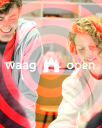The Upfall Shower is now for sale on 350 locations in Holland. All dealers from Beterbad BV can deliver the water saving shower system. The shower system has the KIWA safety quarantee. KIWA meassures show that the Upfall only uses 1,5 liter water a minute.
Want to receive updates like this in your inbox?
Get notified about new updates, opportunities or events that match your interests.
Maybe you will also like these updates
Waag Open: Quantum game night

Bij de eerste editie van Waag Open in het nieuwe jaar duik je spelenderwijs dieper in kwantumtechnologie. Kom langs bij deze game night op donderdag 8 januari en corrigeer samen met je medespelers fouten in kwantumcomputers.
Waag heeft in samenwerking met Universiteit Leiden een digitaal spel ontwikkeld, waarbij je jouw creativiteit inzet voor foutcorrectie in kwantumcomputers. Menselijke vindingrijkheid is nog altijd van grote waarde bij het oplossen van problemen. Precies dit is wat een machine learning-model nodig heeft om fouten in kwamtumcomputers ook op grote schaal te kunnen opsporen. Deze avond speel je het spel en leer je over kwantumtechnologie.
We trappen de avond af met een interactief gesprek over de maatschappelijke impact die kwantumtechnologie kan hebben. Aan het einde van de avond zijn we benieuwd naar jullie ervaring met het spel.
De avond wordt geleid door (spel)ontwerper Douwe-Sjoerd Boschman. Voertaal tijdens dit evenement is Engels. Voorkennis van kwantumtechnologie is niet nodig!
Programma
| 19:30 - 19:45 uur | Welkom & introductie |
|---|---|
| 19:45 - 20:15 uur | Interactief gesprek over maatschappelijke impact van kwantumtechnologie |
| 20:15 - 21:30 uur | Spelen van het kwantumspel |
Over Douwe-Sjoerd Boschman
Douwe-Sjoerd Boschman is freelance conceptontwerper voor interactieve media en schrijver van de prentenboeken serie 'Stout Konijn'. Als spelontwerper creëert hij dwaalsporen door de natuur, educatieve bordspellen over quantum technologie maar ook workshops en e-learnings – zoals de Nationale AI-cursus voor de Creatieve Industrie – over de invloed van nieuwe technologie op onze samenleving.
Toegankelijkheid
Mocht je krap bij kas zitten en wel graag aan dit evenement willen deelnemen, neem dan contact op met sanna [@] waag [punt] org. Het Waag-gebouw is niet toegankelijk voor bezoekers met een mobiliteitsbeperking. Bekijk hier onze toegankelijkheidsinformatie.
Waag Open
Elke eerste donderdagavond van de maand opent Waag haar deuren! Kom langs om te discussiëren en te doen. Want we gaan niet alleen in discussie over maatschappelijke thema's en de toekomst – je leert daarnaast ook altijd iets praktisch. Iets dat je altijd al hebt willen uitproberen, zoals de 3D-printer in het FabLab, of juist iets dat je nooit had verwacht, zoals uitpluizen hoe DNA in elkaar zit in ons biotech-lab. Waag Open vindt plaats in de maakplaatsen op de eerste en tweede verdieping van het historische Waaggebouw op de Nieuwmarkt.
Sensemakers Workshop DIY Smart Glasses

During this evening Paul Stefaan Mooij will introduce the DIY Smart Glasses he developed, he is bringing several 'arms'. The PMSG kit lets you swap out those boring old arms from your (sun)glasses for a custom-made PCBA that looks and functions like something a hacker MacGyver would dream up. It fits just like the original—using the same hinges, screws, and probably duct tape somewhere—but now you’ve got space for sensors, connectors, and all the IoT magic you can pack onto your temples.
Join us to experiment, learn and envision new sensors and possibilities.
https://www.hackster.io/psmooij/pmsg-prototype-modular-smart-glasses-8bd4e6
https://github.com/Control-C/PMSG
You don't have to rsvp via meetup, the workshop is from 19-21h in the Makerspace of the OBA and you can just walk in!
OBA: Oosterdokskade 143, 1011DL Amsterdam
Sensemakers Workshop Meshtastic, configure your own node (for Amsterdam-wide coverage)

Join us to learn to understand the concept of Meshtastic, an open source, off grid, decentralized, mesh network build to run on affordable low-power devices!
Prepare and configure your own device as to contribute to Amsterdam wide coverage, or just for fun / to chat:-)
The workshop is based on this device: https://nl.aliexpress.com/item/1005007752194012.html Of course you may bring a different device, it only might take a little extra effort on your part if the settings are different. We will try to help of course!
You don't have to rsvp via meetup, the workshop is from 19-21h in the Makerspace of the OBA and you can just walk in!
OBA: Oosterdokskade 143, 1011DL Amsterdam

